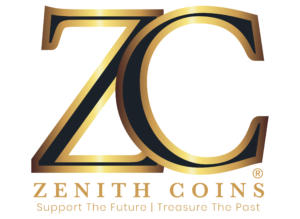Furthermore, the final clash against the Russians in Barcelona was Rangers' 83rd European competitive tie, and in reaching the final Willie Waddell's men became the first team to record three final appearances in the Cup-Winners' Cup.
In 1961, a year after the competition began, Rangers lost a two-legged final 2-0 and 2-1 to Italian side Fiorentina, winger Alex Scott, whose tally of 12 goals in Europe was eventually passed by Ally McCoist, getting the only goal for the Ibrox team.
Six years later, and just a week after Celtic winning the European Cup in Lisbon, Rangers faced up to Bayern Munich in the final in Nuremberg, in what could almost be described as a home tie for the Germans. Rangers had beaten the holders Borussia Dortmund on the way to Nuremberg, but they met their match against Bayern, who won the game 1-0 after extra-time.
If 16 years had seemed an agonisingly long wait before winning a European trophy, then the three decades and more which have followed '72 without the addition of Continental silverware must seem interminable.
Rangers won the Cup-Winners' Cup in season 1971/72 for a number of reasons. First, there was absolute determination in the camp. Captain John Greig has spoken of his team's will to win, especially for the long-suffering Rangers fans who had stuck by the team “in the dark seasons without success”. The late '60s and early '70s was, of course, the period when Jock Stein's Celtic swept aside all before them.
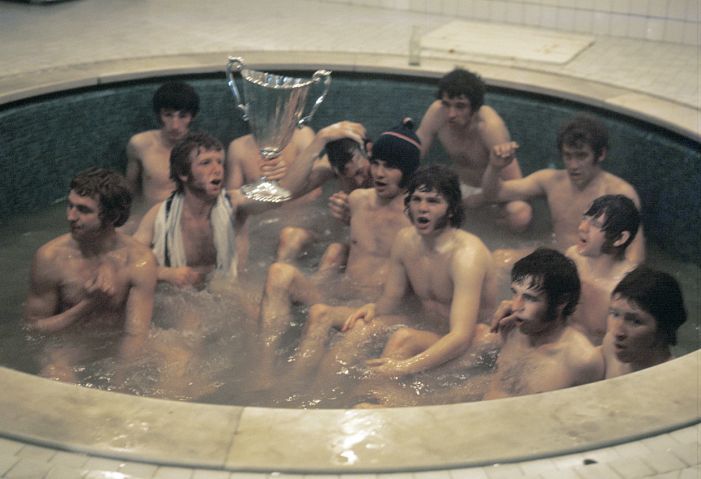
Secondly, Rangers seemed able to raise their game for the European matches that season. Domestically, the Light Blues had had an abysmal start to their season, losing four of their first five league games, going down twice to Celtic in their League Cup section, and later, in the Scottish Cup, being defeated by Hibs in the semis. Whether the opposition underestimated Rangers because of their poor form in Scotland, or whether the players saw Europe as a way to forget their domestic blues, the Cup-Winners' Cup matches saw a different Rangers take to the park.
Thirdly, their European experience eventually paid off in terms of tactical nous. Willie Waddell varied his team's system considerably, depending on players available to him and on what he had seen on his spying trips abroad. Three times they managed 1-1 score-lines away from home, scoring nine goals on foreign soil in total. All four home matches were won.
Lastly, aggression, skill and a fabulous work rate characterised this Rangers side. Colin Stein and Willie Johnston fronted 5-3-2 and 4-4-2 formations, their duty to close down opposition defenders' space drummed into them by Waddell and assistant manager Jock Wallace. With Greig driving the team on, Colin Jackson and Derek Johnstone defending with vigour, and Dave Smith, Scotland's Player of the Year that season, having returned in September 1971 from two broken legs in the space of a year, displaying composure and superb distribution of the ball, the elements for victory were there.
In the first round Rangers were drawn with Rennes. Waddell went for spoiling tactics in Brittany, with the French being harried off the ball and pressed at every opportunity. Willie Johnston scored the opener, with Rennes later equalising. The Rennes manager was not impressed at all, describing Rangers' play as “anti-football”. By the time of the return leg, Rennes were lying second in the French league. Alex MacDonald got the goal at Ibrox and Rangers went through 2-1 on aggregate.
In the next round, Rangers played their first leg against Sporting Lisbon at Ibrox, thrilling the fans with a terrific first-half display which saw them lead 3-0. The Portuguese, though, scored twice in the second 45 to make the return leg a nail-biting prospect for Rangers.
Rangers' trip to Lisbon was horrendous. A strike by airport baggage handlers in London meant it took a day and a half for the team to reach their destination. Sporting led in the Jose Alvalade Stadium 2-1 at half time, then the Gers made it 2-2 to once again seize the upper hand. Sadly, Ronnie McKinnon broke his leg during the second half and things were looking bleak when Sporting struck for the third time. At 5-5 on aggregate, the game went into extra time. Willie Henderson scored for Rangers in extra time, but the Portuguese, with just six minutes left, scored to make it 4-3 on the night, 6-6 on aggregate.

What followed must be one of the most bizarre incidents in the history of any European tournament. The Dutch referee Laurens van Raavens failed to recognise that Rangers, having scored three away goals to Sporting's two, had won the tie. He ordered the teams to take five penalties each. With the Lisbon fans pouring over the barriers and standing on the touchline, Rangers managed to score just one spot kick. The Sporting Lisbon takers did considerably better. As the local fans went crazy with joy, and the goalie Damas was carried off shoulder high, it looked like it was all over for Rangers.
However, Willie Waddell was insistent that the penalty shoot-out should never have taken place. He tracked down UEFA official Senor Ranirez of the Spanish FA and pointed out in the rule book the section on away goals. Indeed, Waddell was correct. The referee was overruled, the result overturned and Rangers were heading into the next round, where they were to meet Torino.
In the Stadio Communale in Turin, Willie Johnston gave Rangers the lead in 25 minutes after a magnificent overlapping run and cross from Willie Mathieson. The Rangers manager and players have since described the second-half onslaught as the fiercest attacking they had ever faced. But Waddell had played the Italians at their own game. He had opted for the catennacio system (literally, “the door bolt”) so favoured by Herrera's Inter. A young Derek Johnstone was asked to operate as centre half alongside Colin Jackson, while the adaptable Smith dropped in behind this duo as sweeper. Torino did manage to break Rangers down, but just once and so the tie was level going back to Ibrox.
Torino were leading Serie A when they arrived in Glasgow. A great performance by Rangers, witnessed by 75,000 fans, saw them through 2-1 on aggregate, the only goal at Ibrox being scored by Alex MacDonald. It was the first time Rangers had beaten Italian opposition over two legs.
Rangers' semi-final pairing with Bayern Munich was as tough as it could get. Six of the Bayern team were to feature in West Germany's 3-1 victory at Wembley shortly after the Cup Winners' Cup ties – goalkeeper Sepp Maier, defenders Franz Beckenbauer, Paul Breitner and George Schwarzenbeck, and strikers Uli Hoeness and Gerd Muller.
An own goal by Zobel in Germany resulted in a 1-1 draw to bring home to Glasgow. At Ibrox, 80,000 supporters cheered a first-minute long-range strike by Sandy Jardine. With John Greig out injured, Waddell had drafted young Derek Parlane into the midfield to mark Franz Roth. In his first European game, Parlane scored the decisive second goal to put arguably West Germany's greatest ever club side out of the competition. On exiting Ibrox, Beckenbauer commented that he was certain Rangers would win the final.
And so to Barcelona and Moscow Dynamo, with whom Rangers had drawn 2-2 in 1945 when the Russians had attracted much excitement by touring Britain.
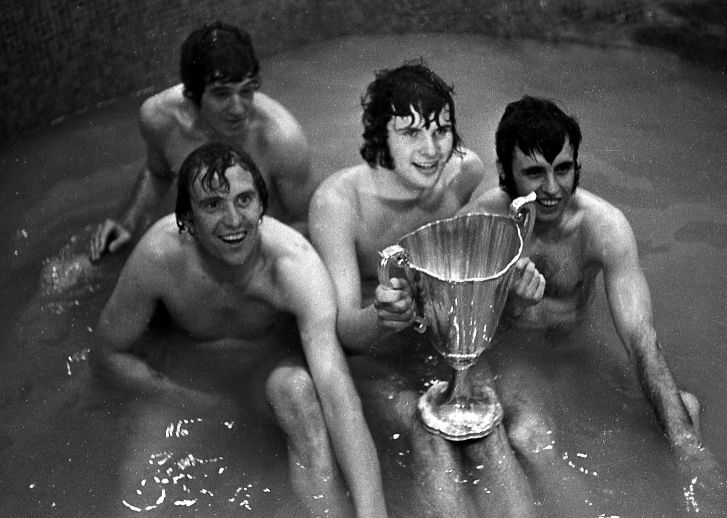
On a problematic spying mission to Moscow, Willie Waddell had to queue to buy tickets for a Moscow Dynamo game in order to assess the opposition! Things did improve on the second day of his visit, with Lev Yashin, the famous Russian goalkeeper, explaining that this was the first time a Soviet team had reached a European final and that the players could be awarded the coveted title Master of Sport, should they return from Barcelona the victors.
Rangers' preparations for the final were better than Dynamo's. The Russians stayed at a hotel in a noisy part of town and became something of a tourist attraction; meanwhile Waddell had his men in a quiet hotel 15 miles from the stadium. The players were discouraged from sunbathing, and food had been brought over from home.
Barcelona itself had seen an invasion of Rangers fans: 110 charter flights, 203 buses and many more travelling independently brought the Rangers support to around 16,000. In contrast, Moscow Dynamo were backed by around 400 fans.
In terms of playing personnel, Colin Jackson had broken down in training, his ankle unable to withstand further rigour, but on the plus side captain Greig had recovered and was set to make his return from injury.
It was a terrific final under the new floodlights of the Camp Nou for the attacking football that was played, though the numerous invasions by drunk, exuberant Rangers fans and the subsequent heavy handedness of the Spanish police marred Rangers' greatest moment.
For 50 minutes of the match Rangers dominated. Dave Smith had a fabulous match, rarely losing possession. Willie Johnston scored twice to add to the opener from Colin Stein. His first was a great header from a perfect Smith pass six minutes before half-time; his second at the start of the second half a low, hard shot which he dispatched after latching on to an enormous Peter McCloy punt.
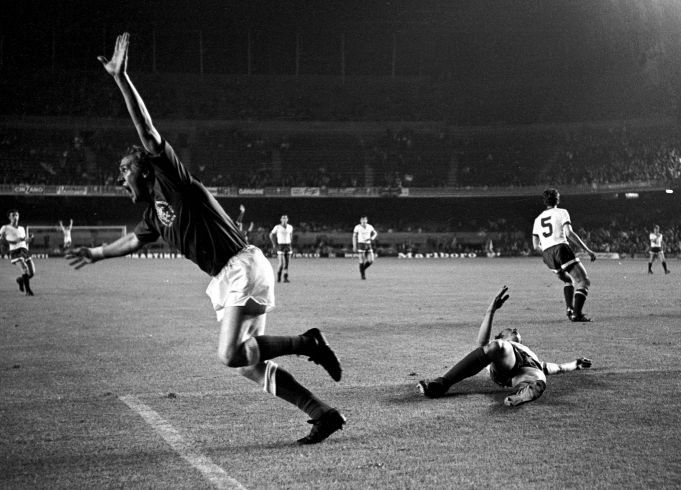
Some Rangers fans, fuelled by duty-free booze, could not contain themselves. They ran on to the pitch after the goals went in, holding up the play and disrupting the flow of the match.
The tension in the stadium heightened when the Russians began a fabulous fightback. Eschtrekov, who had only been on the pitch for two minutes, pulled one back to give the Muscovites hope. As victory became tantalising close, Smith had to boot the ball off the line and then Jardine almost scored an own goal. Rangers were being put through the wringer and their ecstatic fans could barely handle it! With three minutes to go Dynamo scored their second, through Mahovikov, and the tension became unbearable for the Scots.
With a minute remaining, thousands of fans invaded the pitch thinking the match was over. Again the playing area had to be cleared before play could be resumed. Eventually the final whistle sounded and Rangers' European dream had come true.
Jubilant Rangers fans ran on to the pitch once again, and there began an awful battle between baton-wielding Spanish police, who until that point had seemed relatively unperturbed by the fans' antics, and Rangers fans.
The triumphant Rangers team were deep in the Camp Nou, at first unaware of what was happening on the pitch. Captain John Greig was awarded the trophy in a room rather than on the park.
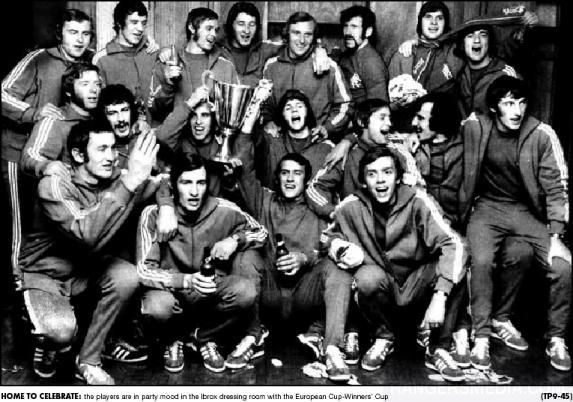
Rangers were handed a two-year ban by UEFA for their fans' poor behaviour. Waddell succeeded in getting this reduced to one year, meaning Rangers could not defend their trophy. Waddell argued that the police had over-reacted, that the fans were drunk but not intent on violence, and that recent European finals had witnessed rejoicing Celtic, Bayern Munich and Ajax fans running on to the park and those occasions had been deemed acceptable.
Rangers won the 1972 European Cup-Winners' Cup the hard way, beating some great sides on the way to Barcelona and in the final itself. Few then could have guessed how long it would be before similar triumphs could be enjoyed.
Teams
Rangers: McCloy, Jardine, Mathieson, Greig, Johnstone, Smith, McLean, Conn, Stein, MacDonald, Johnston
Moscow Dynamo: Pilgui, Basalaycev, Dolmatov, Zykov, Dolbonosov (Gerschkovich), Zukov, Baidazhnyi, Jakobik (Eschtrekov), Sabo, Mahovikov, Evriuschkin
Rangers 3 (Johnston 2, Stein) Moscow Dynamo 2 (Eschtrekov, Mahovikov)
Camp Nou, Barcelona
Attendance: 24,701
[Article Reproduced from the BBC's 'A Sporting Nation' Website]
First Half Highlights
Second Half Highlights
Discuss this article
Enjoyed this article? Disagree entirely? Found a spelling mistake? Whatever your opinion, it's welcome on our popular and friendly message-board.









